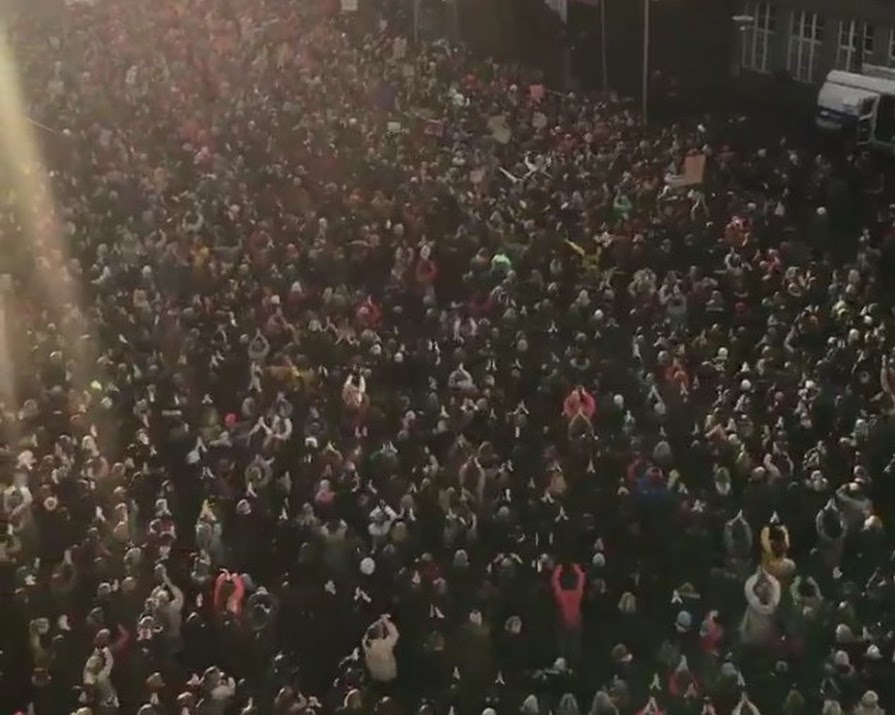By Holly O'Neill
26th Oct 2016
26th Oct 2016
Thousands of women in Iceland left work at 14:38 on Monday to protest the gender pay gap. According to men’s salaries in Iceland, women earn 14% percent less, so the women of Iceland decided to leave work 14% early.
14:38 is the time women in Iceland effectively stop getting paid and start working for free, as men in Iceland are paid on average 14% more to work a full day according to research from Expert Market.
Women in Iceland come together to fight for equality, shouting OUT #kvennafr? #womensrights pic.twitter.com/vTPFwfSoVk
? Salka S?l Eyfeld (@salkadelasol) 24 October 2016
The women of Iceland know how to stage a good protest. On the same date, October 24th, 1975, 90% of their female population stopped working for the day and effectively shut down all businesses. They were not just protesting the unequal pay, they were fed up with having no political representation – only nine women had ever won seats in parliament. The following year, Parliament passed a law that would guarantee equal pay and five years later, Iceland appointed the world’s first democratically elected female president. ?The Women’s Alliance, an all-female political party was established and more than a third of MPs were women by 1999.
Icelandic women have gone on strike today!#kvennafr? #Reykjav?k #iceland pic.twitter.com/rTtWsMLnuR
? Seth Sharp (@sharpseth) 24 October 2016
In 2005, the women in Iceland protested the gender pay gap again and stopped working in protest at 14:08. In 2008, they stopped working at 14:25. The pay gap is narrowing, and the time that women in Iceland spend working for free in comparison to men is lengthening, but Iceland remains one of the best countries in the world for gender equality. Iceland has parental leave legislation that means each parent receives three months? paid leave that is non-transferable, almost half of board members of listed companies are now women, while 65% of Iceland’s university students and 41% of MPs are female, according?to research by The Guardian.?For the last six years, Iceland has been on top of the WEF Gender Pay Gap Index, but the pay gap has been slow to close. If the gap continues to get smaller at this current rate, it will take 52 years before men and women are being paid equally.
My daughter Margr?t (11) marching w all the women of Iceland today,demanding equal pay. They all quit work symbolically at 14:38. #kvennafri pic.twitter.com/SrqVSkHC2F
? Hallgr’mur Helgason (@HalgrimHelgason) 24 October 2016
IMAGE spoke to the National Women’s Council of Ireland?today to see where Ireland sits in terms of the gender pay gap. The NWCI say that in recent years, Ireland’s Gender Pay Gap has widened from 12.6% to 14.4% while the Gender Pension Gap has widened from 35 to 37%.?ESRI research has shown that women in couples suffered a 14% loss in income during the recession compared to 9% for men. This is due to many reasons according to NWCI – women do the majority of care work, childcare costs are among the highest in Europe and the majority of low-paid workers are women, earning €20,000 a year or less. Already vulnerable groups have suffered some of the worst impacts with 58% of lone parents, mostly women, experiencing deprivation.
A new report by the World Economic Forum has also shown that it could take 170 years, until 2186, ?to globally eradicate the gender pay gap and the disparity in employment and pay opportunities for men and women. The study also shows that over the past 11 years, the gender pay gap has only closed by four percentage?points. Richard Samans and Saadia Zahidi, the authors of the report, hope that the report ?will serve as a call to action for governments to accelerate gender equality through bolder policymaking, to business to prioritise gender equality as a critical talent and moral imperative, and to all of us to become deeply conscious of the choices we make every day that impact gender equality globally?.
Women of Iceland, we applaud you.























